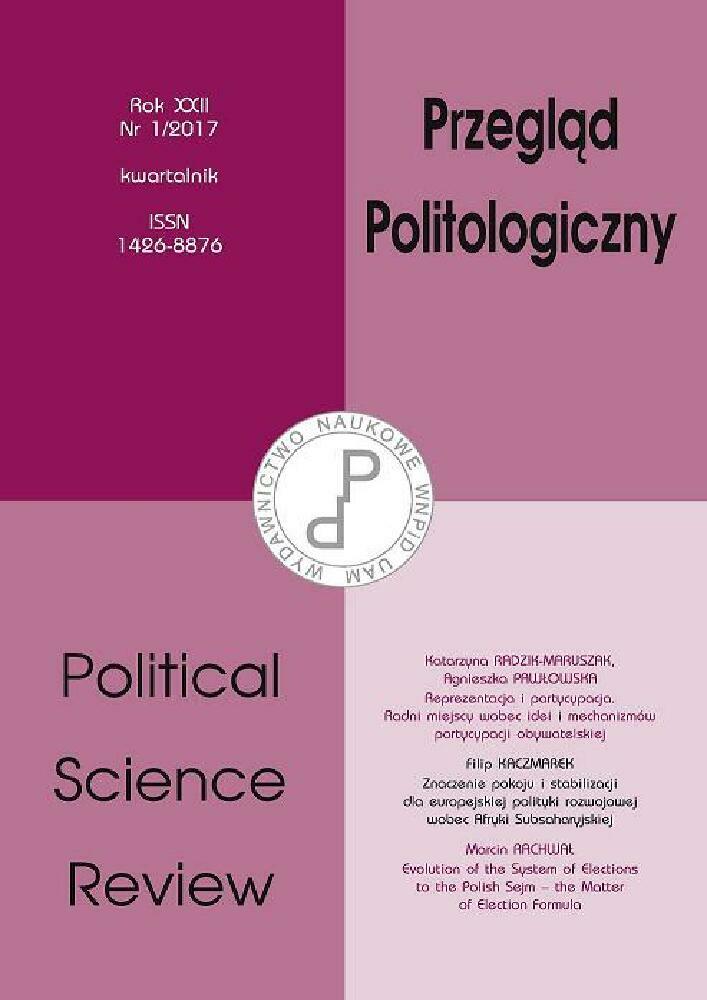Abstract
The tendency to compare the Polish Constitutional Court with its German counterpart produces an illusion that the two institutions not only enjoy almost identical positions in their respective countries, but also that they follow the same procedures and have almost identical powers of adjudication, making the actual position of both institutions similar. The paper deals with the differences in proceedings on constitutional complaints in Poland and Germany and their importance for the actual position of the two courts. The narrow model of constitutional complaint in Poland after 1997 (in particular the possibility to complain solely ‘about the regulation’ and not any about any action of the state) has given a relatively narrow range of ruling to the Polish court from the very beginning. In contrast, due to the extensive access German citizens have to constitutional complaints, its German counterpart issues a wide range of verdicts in different fields of life, and their power resembles that of precedents in Anglo-Saxon law. Thus, one reason for the relatively minor importance of the Constitutional Court in Poland is the limited access of citizens to lodge constitutional complaints, which results in a smaller number of verdicts, making it impossible to develop such a wide range of verdicts as is the case in Germany. After all, the significance of the court depends, inter alia, on the number of verdicts issued, which equates to the number of matters regulated by its rulings.
References
„Biuletyn Rzecznika Praw Obywatelskich” (1988) nr 2.
Böckenförde E.-W. (1981), Nachwort. Gesetzesbegirff und Gesetzesvorbehalt. Bemerkungen zur Entwicklung und zum heutigen Stand der Diskussion, w: Gesetz und gesetzgebende Gewalt. Von den Anfängen der deutschen Staatsrechtslehre bis zur Höhe des staatsrechtlichen Positivismus, Berlin.
Britz G. (2015), Das Verhältnis von Verfassungsgerichtsbarkeit und Gesetzgebung, „Juristische Ausbildung, nr 4, s. 319–325.
Bundesverfassungsgericht Statistiken, http://www.bundesverfassungsgericht.de/DE/Verfahren/Jahresstatistiken/2015/gb2015/A-IV-1.pdf __blob=publicationFile&v=1.
Derlatka M. (2009), Skarga Konstytucyjna w Niemczech, Wydawnictwo Sejmowe, Warszawa.
Dynamika liczby spraw w Trybunale Konstytucyjnym w latach 1998–2014, https://trybunal.gov.pl/fileadmin/content/dokumenty/ds.pdf.
Garlicki L. (1990), Vier Jahre der Verfassungsgerichtsbarkeit in Polen, „Jahrbuch des öffentlichen Rechts”, s. 285–317.
Izdebski H. (2016), Konstytucjonalizm – legicentryzm – ustawowy nihilizm prawny. O powołaniu naszych czasów do nauki konstytucji, „Państwo i Prawo”, nr 6, s. 5–24.
Jestaedt M., Lepsius O., Möllers Ch., Schönberger Ch. (2011), Das entgrenzte Gericht, Eine kritische Bilanz nach sechzig Jahren bundesverfassungsgericht, Edition Surkamp, Berlin.
Kingreen T., Poscher R. (2016), Grundrechte, Staatsrecht II, Monachium.
Lepsius O. (2015), Entscheiden durch Maßstabbildung, w: R. C. van Ooyen, M. H. W. Möllers, Handbuch Bundesverfassungsgericht im politischen System, Springer, Wiesbaden.
Łętowska E. (1992), Pomóż sam sobie, w: Jak zaczynał Rzecznik Praw Obywatelskich, s. 5–8, Łódź.
Łętowska E. (2012), Rzeźbienie państwa prawa 20 lat później, E. Łętowska w rozmowie z Krzysztofem Sobczakiem, LEX, Warszawa.
Małajny R. M. (2013), Polskie prawo konstytucyjne na tle porównawczym, C.H. Beck, Warszawa.
Mączyński A. (2006), Orzeczenia Trybunału Konstytucyjnego, w: Księga XX-lecia orzecznictwa Trybunału Konstytucyjnego, red. M. Zubik, Wydawnictwo Trybunału Konstytucyjnego, Warszawa.
Radbruch G. (1946), Gesetzliches Unrecht und übergesetzliches Recht, w: Süddeutsche Juristenzeitung, s. 105–108.
Rozmaryn S. (1948), Kontrola konstytucyjności ustaw, „Państwo i Prawo”, nr 12, s. 20 i n.
Sulikowski A. (2016), Trybunał Konstytucyjny a polityczność. O konsekwencjach upadku pewnego mitu, „Państwo i Prawo”, nr 1, s. 3–14.
Werner F. (1959), Verfassungsrecht als konkretisiertes Verwaltungsrecht, w: Deutsches Verwaltungsblatt, s. 527–533.
Akty prawne i orzecznictwo:
Grundgesetz für die Bundesrepublik Deutschland (GG) BGBl. z 1949, s. 1 z późn. zm.
Bundesverfassungsgerichtsgesetz (BVerfGG), BGBl. I z 1993, s. 1473.
Konstytucja Rzeczypospolitej Polskiej z dnia 2 kwietnia 1997 r., Dz. U. 1997, Nr 78, poz. 483.
Ustawa o Trybunale Konstytucyjnym z dnia 1 sierpnia 1997 r., Dz. U. 1997, Nr 102, poz. 643 z późn. zm.
Ustawa o Trybunale Konstytucyjnym z dnia 22 lipca 2016 r., Dz. U. 2016, poz. 1157.
Entscheidungen des Bundesverfassungsgerichts, tom 7, str. 14 i n.
Wyrok Trybunału Konstytucyjnego z dn. 15.10.2002 r. (sygn.: SK 6/02).
